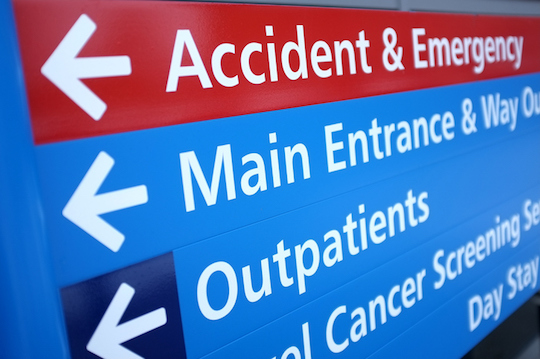Attendances are up again, and, to cope, we need to change our way of working
It shouldn’t really be called the “Emergency Department.” It should be called the Department for PNEWS (Patients No-one Else Wants). If the police can’t cope with a mentally disturbed patient, a GP can’t get an urgent outpatient appointment, or a family can’t cope with an elderly relative, they send them to the emergency department.
As doctors get older it is a cruel specialty for those working there too. Day and night, it never stops. You come on-shift and there are fifteen patients waiting to be seen. You get your head down and start trying to clear the back-log. Nine hours later, you slip out of your scrubs, and there are now twenty patients waiting to be seen. You weren’t running to stand still, you were actually slipping backwards. There is a sense that if you dropped dead tomorrow no-one would even notice apart from a flurry of emails from medical staffing trying to find a locum to stand-in for your shifts. No wonder juniors do their six months and then shake the dust from their feet, heading for the Antipodes, or for specialties where there is no night or weekend work.
But there is a real pleasure in the job too. The variety of patients provides a cornucopia of training opportunities for medical students and junior doctors. You can coach them through this fascinating world steadily building up their confidence and competence in every aspect of medicine. Then you can patch up their fragile egos after they have received yet another “grilling’’ from a specialty registrar trying to block a referral to that specialty. At the end of each shift I write a thank you note (copy to consultant) to any specialty registrars who have been constructive and helpful when taking a referral. I don’t have to write many letters, certainly fewer than the letters of complaint I would like to write to all those who haven’t helped. One staff grade, who received one of my “thank you” letters said it was the first and only nice letter she had received in fifteen years of work at our hospital.
But something has to give. Attendances are up again, and, to cope, we need to change our way of working, not ask for more money.
The way in which we still process emergency patients is antediluvian. Paramedics now do superb “clerkings” as they bring the patients in by ambulance, but as soon as the patient arrives, the process is repeated by a triage nurse. Then it is the turn of the casualty officer to perform another clerking before presenting the case to their senior who may choose to clerk the patient again. Now it is time to call the specialist team who send their most junior doctor to repeat the process, and present to their registrar. Finally, the case is shown to the consultant on the take ward-round. By now, the patient has been exhausted by all the clerkings and darkness has fallen, so it is no longer safe to send them home even if it had been earlier.
We have no link to the GP’s computers so all this work has been done without sight or access to the GP notes which may be a gold mine of information on the patient’s illness. Our computer system requires more than 50 separate clicks on tiny boxes on many screens just to progress through the system. That does not include any notes taken. So the P/C ratio, (the ratio of time spent speaking with the patient compared with interacting with the computer) is well below 30%. It cannot be appropriate to have each patient clerked 5 or 6 times before a decision is made on admission, nor a computer system which wastes 10 minutes of doctor’s time on each patient, however trivial the complaint.
However both of these issues pale into insignificance compared with the challenge of providing life-long job satisfaction in a career consisting of endless night and weekend shifts. The consequence is that if we don’t do something radical soon, I fear that the emergency department may collapse and bring the whole NHS system down with it. Sometimes, when I am not on duty, I muse about how our society as it is now will be seen in 100 years’ time. Children might be taught in history classes that in 1948 a small island off the west of Europe set-up a revolutionary advance in civilization which was the talk of the rest of the world. It was called the NHS and provided free healthcare for all. My fear is that the next sentence from the teacher will be that it collapsed in the year 201..?
Chris Bulstrode was a Professor of Orthopaedics at Oxford and retired early to retrain as an Emergency Medicine doctor. He was awarded the CBE in 2015 for humanitarian work. He now does locum work in A&E as well as working as a ship’s doctor.
